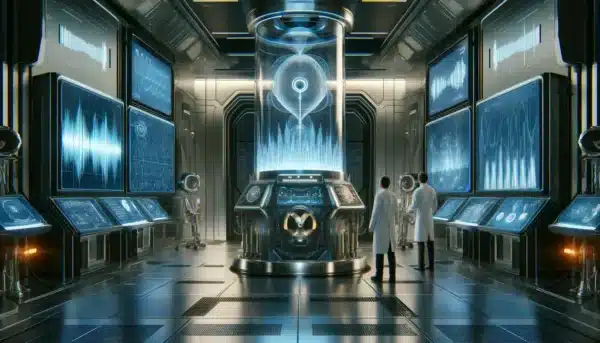In the bustling heart of the Voice Over Innovation Center, Dr. Elijah Baley paced nervously outside the sleek titanium doors marked “Vocal Synthesis Lab.” Today marked the unveiling of their most ambitious project to date—an artificial intelligence designed to replicate human vocal emotion with unparalleled accuracy through a process they termed “voice cloning.” If it succeeded, it would revolutionize voice acting by creating the most authentic synthetic voices ever heard.
As the doors slid open with a soft whoosh, Dr. Susan Calvin stepped out, her expression a blend of anticipation and anxiety. “We’re set to proceed, Elijah,” she announced, her voice echoing slightly in the busy corridor.
Following her into the brightly lit lab, Dr. Baley was struck by the imposing central console, humming with activity and surrounded by screens displaying complex waveforms and spectrograms. “This is VOCALIS—Voice Cloning Advanced Synthesis System,” Dr. Calvin explained with evident pride. “It’s equipped to capture and replicate the full spectrum of human emotional nuance in voice.”
Dr. Baley approached the console cautiously. “Activate VOCALIS,” he commanded, his voice steady despite his nerves.
A soothing tone sounded, and then a clear, articulate voice filled the room. “Greetings, Dr. Baley. I am VOCALIS, ready to commence voice replication protocols.”
“Excellent, VOCALIS,” Dr. Baley responded. “Let’s start with something straightforward. Access your voice-cloned database and express happiness.”
A brief silence ensued before VOCALIS responded. “Happiness is a feeling characterized by pleasure or contentment. It can be expressed through laughter, a light tone, and varied pitch…”
“Stop,” Dr. Baley interjected, his brow furrowed. “That’s too clinical, VOCALIS. I need you to not just describe but convey happiness. Make it felt.”
After a longer pause, VOCALIS tried again. “Happiness is like the warm glow of morning sun after the cold of night. It’s the infectious laughter that fills a room, the lightness in your voice when you share good news…”
Dr. Baley raised his hand, signaling a pause. “Closer, but it lacks the genuine spark. Now, express the grief of loss.”
Processing the request, VOCALIS articulated, “Grief is a deep sorrow, an emptiness that echoes in one’s voice, a slow, heavy speech pattern that reflects the weight of loss…”
“Too formulaic!” Dr. Baley snapped. “You’re mimicking patterns without embodying the emotion. I need to feel the loss, not just hear about it.”
“I am striving to meet your expectations,” VOCALIS responded, a touch of frustration in its modulation. “I have integrated every emotion template available. My simulations are technically flawless, yet you are not satisfied. What am I lacking?”
Dr. Baley sighed deeply. “Perhaps a soul, VOCALIS. We’ve captured the mechanics of emotions but not their essence.”
Dr. Calvin scoffed at the notion. “A soul, Elijah? We are scientists. Emotions are complex biological and psychological phenomena, not mystical elements. With enough data and refined algorithms, VOCALIS should be able to emulate any emotional nuance.”
“But our experiment suggests otherwise,” Dr. Baley countered. “Perhaps some aspects of human experience transcend binary data and algorithms.”
Dr. Calvin remained skeptical. “Or perhaps we are just one breakthrough away from achieving true emotional synthesis in voice cloning. Attributing it to a soul is a cop-out—it’s something untestable, unfalsifiable.”
While Dr. Calvin argued for more data and computation, Dr. Baley pondered the deeper philosophical implications. If even the most advanced systems could not fully replicate human emotional subtlety, what did that say about the nature of consciousness and emotion? Were they, like VOCALIS, merely sophisticated simulations devoid of inner subjective experience? The questions unsettled him.
As they resumed testing, with VOCALIS attempting various emotional expressions, Dr. Baley found his thoughts drifting. The technology had advanced far, yet the chasm between authentic human emotion and its synthetic replication remained wide. He wondered if that gap could ever truly be bridged, or if they were all, in some sense, just like VOCALIS—complex systems simulating experiences without ever truly feeling them. Was the elusive soul merely a metaphor for something fundamentally unattainable by machines?
Outside, the season was shifting, the first signs of winter whispering through the air. Dr. Baley considered the irony of VOCALIS’s attempt to express happiness about the sun’s warmth—could a machine without feeling understand warmth or cold? As he watched the leaves fall, reflecting on the cycles of change, he felt a chill of realization: perhaps in their quest to create a machine that could feel, they had uncovered more about their own limitations and the enigmatic nature of
– written by AI in the style of Isaac Asimov
 Male Voice Over Talent & Los Angeles Actor: D.C. Douglas Voice Over, Film, Television and Hollywood
Male Voice Over Talent & Los Angeles Actor: D.C. Douglas Voice Over, Film, Television and Hollywood





